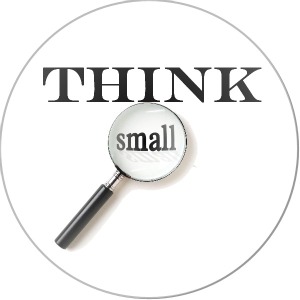For the external blog analysis, I choose a blog written by Jeff Rodman at the Harvard Business Review. As a Co-Founder and Chief Evangelist at Polycom, Jeff states that thinking small helped him built a $2 billion company. This tiny shift in thinking “ is what set us on the path to selling millions of phones and changing what conference rooms look like today.”
Big things happen because of small things. Jeff escapes the myth of going big and shares small things he learned, which are small innovations, small designs and small habits, to make a big difference.

Small Innovations
The hinge for innovations is doing more with less. It’s not necessary for firms to always come up with disruptive innovations; doing sustaining innovations and have changes on previous products, or ways of distribution, is sometimes a better choice. Instead of having obsession on big, they should identify what’s the smallest change they can make on Business Model Canvas, from key activities to channels, to make customers better. The value proposition of a firm should be making life easier, and that’s what the customer segments really want.
Small Designs
I strongly agree with this point. Rather than focusing on innovation, firms should care about simplifying customer experiences. If the innovation makes the product look fancy but complex while using it, customers will not stick on it in the long run. Take the example of Nokia in 2012, the product looked pretty but the operating system was complex and not widely used. This is why it bankrupted.
Small habits
This ties directly to business success. Such habits could be saving cost, preserving the environment, and communicating with employees. Starting from small helps build business ethics within the firm when it doesn’t aiming huge profit but improving environmental awareness, saving costs, etc. Applying business ethics raises internal unity and external attention. Small actions, such as using wasted material as resources, are also a symbol of sustainability and social responsibility.
Going small doesn’t mean the firm can’t go big. Focusing on small innovations, designs and habits, and there would be a remarkable big success.
